Justice Elena Kagan continues to express support for an enforceable Supreme Court ethics code. During remarks this week at New York University Law School, the justice revisited a theme she explored earlier this summer. And Kagan’s latest remarks follow a recent interview with Justice Ketanji Brown Jackson, in which Jackson also spoke favorably of implementing an enforcement mechanism for the Supreme Court’s code.
Last year, the court adopted a code, but it contains no enforcement tools. Observers immediately realized that this rendered the code powerless.
NBC News reported that Kagan said at NYU on Monday:
It seems like a good idea to make sure that we live up to our own code of conduct in the future. It seems like a good idea to make sure that people trust that we are doing just that.”
While there are questions about how such a code could be enforced, Kagan said a panel of lower court judges appointed by Chief Justice John Roberts could rule out baseless claims against judges while still examining legitimate claims.
President Joe Biden has pushed for a binding code among his proposed Supreme Court reforms. Whether one will come — whether imposed externally by Congress or internally by the court — remains to be seen. But it remains important for justices to weigh in on the issue, even if only a few do so far.
To be clear, an enforceable code need not be a partisan issue. But when it is the Republican-appointed judges who apparently do not want enforcement, it becomes unnecessarily more partisan. If the court’s Republican-appointed supermajority had wanted such a code, it could have pushed for it.
That appearance of bias is further reinforced by the fact that it was the ethical controversies of Republican-appointed Justices Clarence Thomas and Samuel Alito that fueled the pressure to create the current (weak) code. Indeed, public scrutiny of those judges may make them less willing to voluntarily subject themselves to further scrutiny, let alone actual consequences.
Perhaps no one would really want to face consequences if they had the choice — but most of us don’t make the rules we play by. The Supreme Court’s continued lack of a binding ethics code underscores the extent to which the justices effectively play by another set of rules: their own.
Subscribe to the Deadline: Legal Newsletter for updates and expert analysis on the most important legal stories. The newsletter will return to its regular weekly schedule when the Supreme Court’s next term begins in October.
This article was originally published on MSNBC.com
